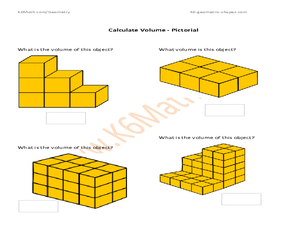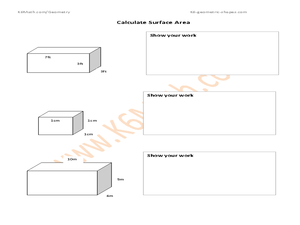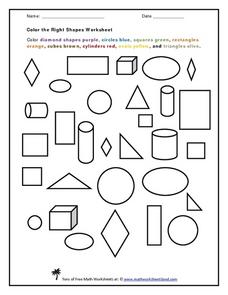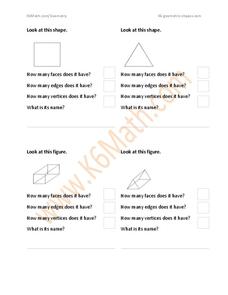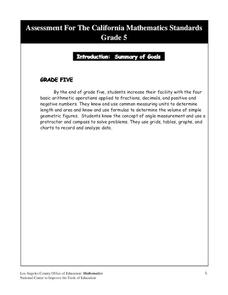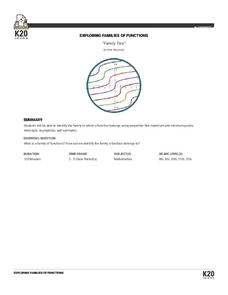Curated OER
Reading and Writing Numbers up to Thousands
Budding math analyists look at 4-digit numbers that are broken down by thousands, hundreds, tens and units. They write each number in words and represent them using their unifix cubes of base 10 blocks. There are two problems to complete...
Curated OER
Volume and Surface Area
Students explore volume and surface area. In this math instructional activity, students fill boxes with cubes to identify the volume of the boxes. Students discuss area.
Curated OER
ONES and TENS
Before you can teach place value or regroup, you need to provide students with a concrete idea of the definition of ones and tens. Here, ones and tens are defined and then shown several different ways in order to represent several...
Curated OER
Jessica's Aquarium
Sixth graders use problem solving strategies to determine the amount of gravel needed to fill the bottom of an aquarium that is 50 cm long, 20 cm wide, and 30 cm high. Students use centimeter cubes and brainstorm strategies they might...
Curated OER
Compare and Order Numbers
Students compare and order numbers to 100. They count numbers forwards and backwards. Given specific numbers, students place the numerals in the correct order. Students use bean bags, cubes, or blocks to compare and order numbers.
Curated OER
Countdown Challenge: Platonic Solids - Part II
In this platonic solid worksheet, students observe five solids and draw a net of each three-dimensional figure. Students examine a tetrahedron, an octahedron, an icosahedron, a cube, and a dodecahedron. This is a one-page worksheet.
Curated OER
Steps to Factor a Polynomial
Students explore the concept of factoring polynomials. In this factoring polynomials worksheet, students factor using a GCF, by grouping, a difference of two squares, two cubes, etc.
Pennsylvania Department of Education
Problem Solving by Using Multiplication to Solve Division Problems
Learners use index cards, counting cubes, and their own understanding to identify how division problems can be solved by using multiplication. In this division lesson plan, students use their multiplication skills to solve division...
Curated OER
Calculate Volume: Pictorial
Learners find the volume of four figures drawn in shaded cube form. A reference web site is given for additional activities.
Curated OER
Calculate Surface Area Worksheet
Learners calculate the surface area of three rectangular prisms, including a cube, based on given dimensions. There are only three diagrams with which to work. Nice homework, as it provides practice, but isn't too much busy work or...
Curated OER
Understanding 10: Backwards and Forwards
Help your young mathematicians completely master 10 by practicing one-to-one correspondence, number recognition, and recording numbers displayed. They make 10 with groups of two-different colored cubes and color in 10-frames to show how...
Curated OER
Probability
Using real life examples, learners discuss probability and ratios. They begin by answering a set of questions, and then participate in a probability activity involving a bag of colored cubes.
Curated OER
Color the Right Shapes
I remember doing this activity when I was little. Learners color each shape the color indicated at the top of the page. Squares are blue, cubes are red, circles are green and so on. There are 30 shapes to identify and color.
Curated OER
The Hundreds Place
Young mathematicians examine images of counting cubes to determine the value of each set. The arrangement values include hundreds, tens, and ones. Encourage scholars to utilize place value knowledge instead of addition and counting with...
West Contra Costa Unified School District
Adding by finding 10's
Count with ten frames in a first grade addition lesson. Kids determine how to identify numbers on a number line, as well as with ten frames, and complete ten frames to show their answers in several addition problems.
Curated OER
Geometric Shapes and Figures
Are your mathematicians figuring out the difference between shapes and figures? Using a simple, visual identification worksheet, students analyze 2 shapes and 2 figures, answering 4 questions about each. Learners determine their...
Laura Candler
Fishbowl Multiplication
Transition young mathematicians from using repeated addition to multiplication with this fun, hands-on activity. Using manipulatives and the included game board, students work in pairs modeling repeated addition problems before...
Math Learning Center
Grade 1 Supplement Set A5 – Number and Operations: Place Value
First graders work together to sort, categorize, and order collections of objects through activities that help build number sense.
Mathematics Assessment Project
Representing Functions of Everyday Situations
Functions help make the world make more sense. Individuals model real-world situations with functions. They match a variety of contexts to different function types to finish a helpful resource.
Super Teacher Worksheets
Solid Figures
In the hustle and bustle of everyday life it's easy to forget that geometric shapes are everywhere in the world around us. As they complete this shape identification worksheet, young mathematicians realize that many common real-life...
Math Wire
Gingerbread Man Combinations
Gingerbread men are just like us—they're unique! Discover how many combinations are possible when constructing a gingerbread man with several choices for shapes and colors of eyes, noses, and buttons.
Los Angeles County Office of Education
Assessment for the California Mathematics Standards Grade 5
Test young mathematicians' knowledge with an assessment aligned to California's fifth grade state standards. The exam covers a multitude of concepts including fractions and decimals, positive and negative numbers, measurement; and how to...
Curriculum Corner
St. Patrick's Day Bump
Practice multiplying, and celebrate St. Patrick's Day simultaneously with a fun learning game. Here, players roll two six-faced number cubes and multiply the two face-up numbers to find the product. Then, they place a marker on the...
K20 LEARN
Family Ties: Exploring Families OF Functions
They say it runs in the family. Small groups use a card sorting activity to group graphs of functions into families. After grouping by families, the class develops conclusions for parent functions and create a graphic organizer.










